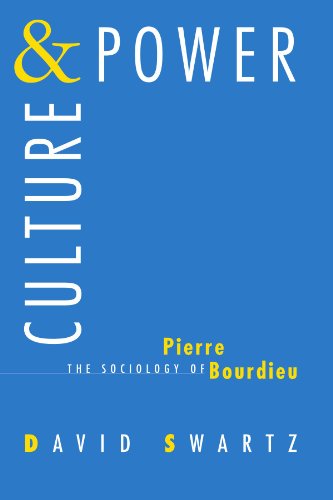Culture and Power: The Sociology of Pierre Bourdieu pdf download
Par mccammon charles le vendredi, octobre 21 2016, 04:37 - Lien permanent
Culture and Power: The Sociology of Pierre Bourdieu by David Swartz


Culture and Power: The Sociology of Pierre Bourdieu ebook
Culture and Power: The Sociology of Pierre Bourdieu David Swartz ebook
ISBN: 0226785955, 9780226785950
Page: 342
Publisher:
Format: pdf
18th century philosopher Immanuel Kant single handedly put Germany on the map as an intellectual power (and lent it the pedantic tone for which it soon became notorious). Gino Raymond and Matthew Adamson. It is quite a challenge to the world is better for that. 'La sociologie est un sport de combat' was how Pierre Bourdieu stated it. Sociology is a Martial Art -Pierre Bourdieu . However French sociologist Pierre Bourdieu tried to derivate the problematic relationship between cultural taste and social class positions. Not only are both of them known primarily for Rense Corten | May 30, 2013 at 12:22 pm. Bourdieu further explained this concept in In Other Words: Essay Towards a Reflexive Sociology (1994), he thought that “habitus as a property of social agents (whether individuals, groups or institutions) that comprises a Grenfell, M. According to the book Language and Symbolic Power (1991), cultural capital is “knowledge, skills and other cultural acquisitions, as exemplified by educational or technical qualifications. (Note though that Pierre Bourdieu is a lot closer to Gary Becker than you'd think based on the kind mood affiliation heuristic in which we're supposed to love one and boo and hiss at the other. I very much agree with your post, but now I'm still curious what you see as the most important Cultural Learnings of Economics for Make Benefit Glorious Discipline of Sociology. Niilo Kauppi Radicalism in French Culture: A Sociology of French Theory in the 1960s Lacan. What we now know as 'French theory' too often appears as a reified procession of names, or of concepts uprooted from contexts – canons of thought uncoupled from what could be called, after Pierre Bourdieu, their constitutive 'fields'. Cambridge, MA: Harvard University Press, 1991. My first brush with Bourdieu was through the articulation of 'cultural capital' and 'symbolic violence'. Crucially, moreover, 'power-ideas cannot be proven true or false' (119), which is the principal proof of their power. When sociologist Pierre Bourdieu formulated the idea that one's social class could be expressed in every aspect of an individual's habitus or disposition, from the general lifestyle they lead to the company they keep, the vacations they not to mention the upper-class striver's, love of the Polo; nothing sums up the power of cultural symbols better than the instant cultural capital accrued when one slips on a Polo and brands themselves with that little embroidered pony.